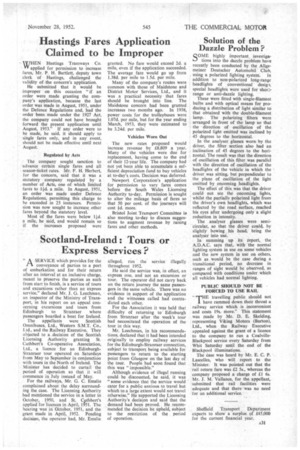Hastings Fares Application Claimed to be Improper
Page 33

If you've noticed an error in this article please click here to report it so we can fix it.
WHEN Hastings Tramways Co. IT applied for permission to increase fares, Mr. P. H. Bartlett, deputy town clerk of Hastings, challenged the validity of the concern's application.
He submitted that it would be improper on this occasion "if an order were made granting the company's application, because the last order was made in August, 1951, under the Defence Regulations and, had the order been made under the 1927 Act, the company could not have brought forward the present application until August, 1953." If any order were to be made, he said, it should apply to single fares only, and in any event, should not be made effective until next August.
Regulated by Acts
The company sought sanction to advance certain single fares and all season-ticket rates. Mr. F. H. Herbert, for the concern, said that it was a statutory company regulated by a number of Acts, one of which limited fares to 1W. a mile. In August, 1951, an order was made under Defence Regulations, permitting this charge to be exceeded in 25 instances. Permission was now sought to increase other fares beyond the statutory level.
Most of the fares were below lid. a mile, he said, and would remain so if the increases proposed were granted. No fare would exceed 2d. a mile, even if the application succeeded. The average fare would go up from 1.38d. per mile to 1.5d. per mile.
Many of the company's routes were common with those of Maidstone and District Motor Services, Ltd., and it was a practical necessity that fares should be brought into line. The Maidstone concern had been granted increases two months ago. In 1938, power costs for the trolleybuses were 1.07d. per mile, but for the year ending March, 1953, they were estimated to be 3.24d. per mile.
Vehicles Worn Out
The new rates proposed would increase revenue by £8,809 a year. Many of the vehicles were due for replacement, having come to the end of their 12-year life. The company had not yet been able to accumulate a sufficient depreciation fund to buy vehicles at to-day's costs. Decision was deferred.
Newport Corporation's application for permission to vary fares comes before the South Wales Licensing Authority to-day. Permission is sought to alter the mileage basis of fares so that 50 per cent, of the journeys will cost id. more.
Bristol Joint Transport Committee io also meeting to-day to discuss suggestions to augment revenue by raising fares and other methods.




















































































